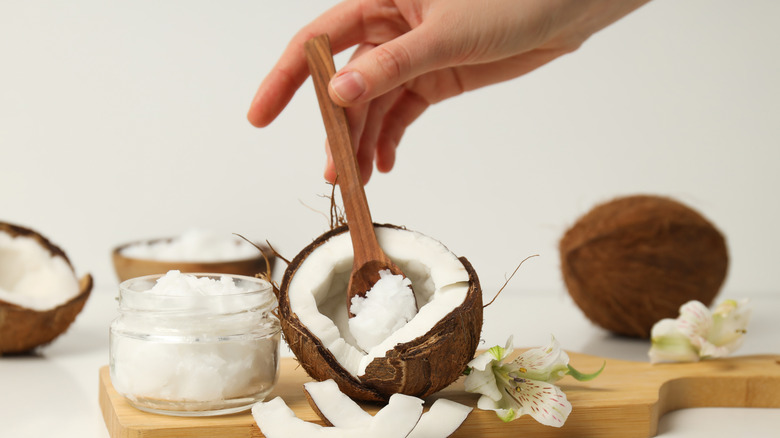A Trendy Tropical Fruit Full Of Healthy Minerals Is Low Carb And High Fiber
Although living a low-carb lifestyle isn't for everyone, it can be helpful if you're trying to shed some weight or protect yourself from a future diabetes or cardiovascular disease diagnosis. However, you may worry that you'll have to avoid fruits to fully embrace low-carb meal planning. But that's not true.
Some fruits can be surprisingly low in carbs while still being overflowing in terms of nutrition, including one that smells like summer: the coconut. In fact, every ounce of dried and shredded coconut meat supplies you with just 6.69 grams of carbs. However, those total carbs aren't all sugars. A full 4.62 grams (around two-thirds) is attributable to fiber.
When you eat foods with a lot of fiber, like coconut, you may experience less of a sugar spike in your glucose readings immediately after you've finished. Why? It's all that fiber that keeps your stomach from digesting food too quickly.
The potential health benefits of coconut consumption
Slower digestion doesn't mean you won't feel more alert and activated after chowing on some coconut meat. As explained by registered dietitian Natalie Romito to Cleveland Clinic, coconut's saturated fat (medium-chain triglycerides) acts as a stimulant for your body. "Medium-chain triglycerides . . . go directly to your liver, giving your body an almost immediate energy boost," she noted. (And that means you don't necessarily need to bulk up on carbs to power through your workout or stay alert during your too-long morning meeting.)
How about the cardioprotective power of coconut? A 2024 trial in Global Epidemiology showed that consuming coconut milk (a byproduct made primarily from coconut meat) over eight weeks could decrease low-density lipoprotein (LDL) cholesterol. However, shredded coconut consumption over the same period didn't have the same effect.
Therefore, you may want to alternate between shredded coconut and coconut milk to mix up your potential health benefits. If you do, you'll still get low-carb and high-fiber advantages, since one cup of coconut milk provides just 13.3 grams of carbs, with 5.28 of those grams as fiber. (You could always try switching from another plant-based milk and see how you feel when you drink coconut milk every day.)
Coconut meat is filled with nutrients, but there's a catch
Coconut has other important nutrients hidden inside its white flesh, including magnesium, manganese, copper, and selenium.
Magnesium helps your muscles and nerves, and is crucial in many bodily functions. Meanwhile, manganese encourages your system to fight off inflammation and keeps your bones strong. (Here are the differences between magnesium and manganese.)
Getting sufficient amounts of copper in your diet could lower your risk of Alzheimer's and heart disease. (Aim to take in around 900 to 1,000 micrograms daily.) Lastly, selenium has important roles to play in DNA synthesis, thyroid hormone metabolism, and other critical body processes.
There's just one catch: You'll need to stick to unsweetened coconut products to ensure you're staying within low-carb parameters and not veering into high-sugar territory. Sweetened coconut flakes, for instance, contain 14.7 grams of carbs per ounce, 10.4 grams of which are sugar.


